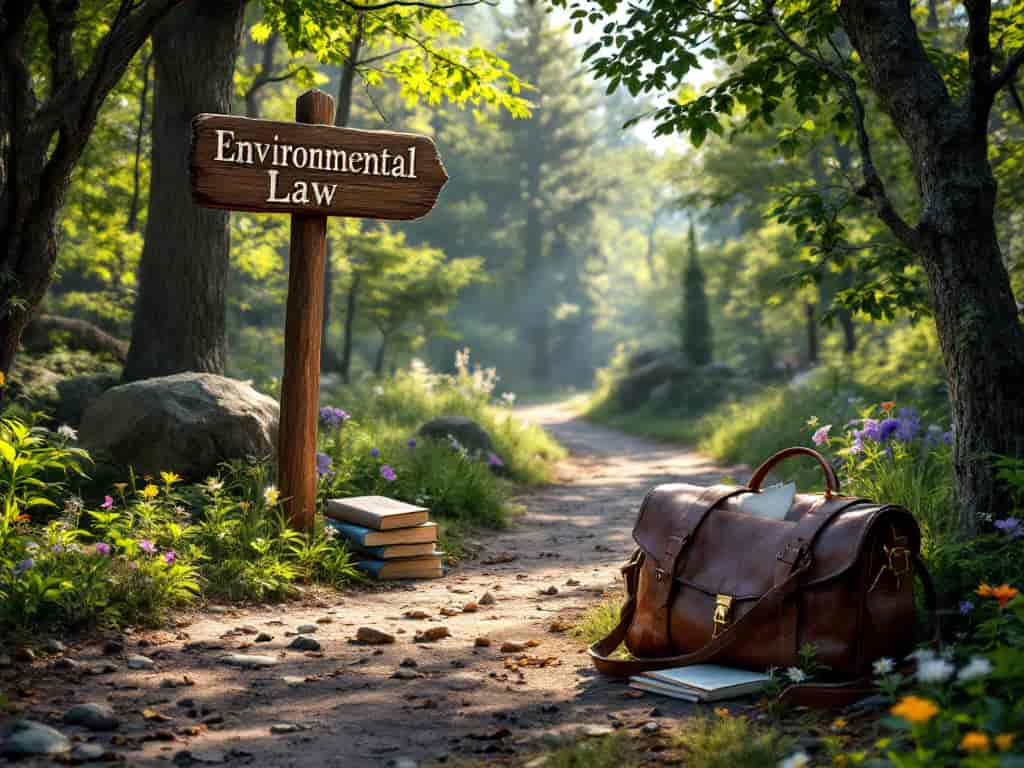Beginner’s Guide to Environmental Law
Ellie Moore

Photo: Beginner’s Guide to Environmental Law
Beginner’s Guide to Environmental Law
Environmental law is a complex yet essential field that governs the interactions between humans and the natural world. As the impact of human activity on the environment continues to grow, understanding environmental law has become crucial for policymakers, businesses, and individuals alike. Whether you're considering a career in environmental law, seeking to comply with regulations, or simply interested in how these laws affect daily life, this beginner’s guide will walk you through the fundamental aspects of the subject.
What is Environmental Law?
Environmental law encompasses a body of regulations, statutes, and legal principles aimed at protecting the environment and promoting sustainable development. It is a multidisciplinary field that combines elements of law, science, economics, and politics. The primary goal of environmental law is to balance human needs with the health of the planet, addressing issues such as pollution control, natural resource management, and conservation of biodiversity.
Why is Environmental Law Important?
In today’s world, environmental issues are more pressing than ever. Climate change, deforestation, pollution, and loss of biodiversity are just a few examples of the environmental crises that require legal intervention. Environmental law is critical because it:
- Protects Public Health: It sets limits on harmful emissions and pollutants, ensuring air, water, and soil quality are maintained.
- Promotes Sustainability: Environmental law encourages the responsible use of natural resources to ensure future generations can thrive.
- Regulates Business Practices: It holds companies accountable for their environmental impact, promoting green business practices and eco-friendly technologies.
By establishing clear rules and frameworks, environmental law helps prevent the degradation of ecosystems and ensures that businesses and individuals act in ways that do not harm the environment.
Key Areas of Environmental Law
Environmental law covers a wide range of topics, each with its own set of rules and regulations. Here are some of the key areas:
1. Pollution Control Laws
Pollution control is one of the most critical aspects of environmental law. Laws in this area regulate the emission of pollutants into the air, water, and soil. Key regulations include:
- The Clean Air Act (CAA): A U.S. federal law designed to control air pollution by setting limits on emissions from industrial facilities, power plants, and vehicles.
- The Clean Water Act (CWA): Regulates discharges of pollutants into water bodies and sets water quality standards.
- The Resource Conservation and Recovery Act (RCRA): Governs the disposal of solid and hazardous waste.
These laws are essential in reducing the negative impacts of pollution on human health and the environment.
2. Biodiversity Conservation
Environmental law also plays a crucial role in protecting endangered species and ecosystems. Some key laws in this area include:
- The Endangered Species Act (ESA): A U.S. law that aims to protect species at risk of extinction by regulating the habitat destruction, poaching, and illegal trade of these species.
- Convention on International Trade in Endangered Species (CITES): An international treaty aimed at ensuring that international trade in wild animals and plants does not threaten their survival.
These laws help preserve biodiversity, ensuring the survival of species and the health of ecosystems around the world.
3. Climate Change and Sustainability
Climate change is one of the most pressing issues of our time. Environmental law plays a significant role in regulating greenhouse gas emissions, promoting renewable energy, and encouraging sustainable development. Some major agreements and regulations include:
- The Paris Agreement: An international treaty under the United Nations Framework Convention on Climate Change (UNFCCC) that aims to limit global warming to below 2°C above pre-industrial levels.
- The Clean Energy Standard (CES): A policy that promotes the use of renewable energy sources like solar, wind, and hydropower.
Through these initiatives, environmental law seeks to mitigate the effects of climate change and promote a shift toward sustainable, low-carbon economies.
4. Natural Resource Management
The management and conservation of natural resources are vital to maintaining the balance of ecosystems and ensuring future generations have access to these resources. Environmental law regulates the use of resources such as water, land, forests, and minerals.
- The National Environmental Policy Act (NEPA): Requires federal agencies to assess the environmental impact of major projects before they are approved.
- The Federal Land Policy and Management Act (FLPMA): Regulates the management of public lands in the U.S.
By regulating how natural resources are used, environmental law ensures that these resources are not depleted or damaged beyond repair.
Environmental Law and Business
Businesses are often at the forefront of environmental law, especially as they must comply with a range of regulations designed to minimize their environmental footprint. Failure to comply with environmental laws can result in hefty fines, lawsuits, and reputational damage.
Here are a few key ways businesses are impacted by environmental law:
- Compliance with Environmental Regulations: Businesses must adhere to laws governing pollution, waste disposal, resource use, and emissions. Non-compliance can result in penalties.
- Corporate Social Responsibility (CSR): Increasingly, companies are adopting sustainability initiatives as part of their CSR efforts, which are often driven by legal frameworks.
- Sustainable Innovation: Environmental law incentivizes businesses to innovate in the areas of green technologies and energy-efficient solutions.
By understanding environmental law, businesses can not only avoid legal pitfalls but also contribute positively to sustainability efforts.
The Role of Environmental Lawyers
Environmental lawyers specialize in the field of environmental law, providing legal advice and representation to clients involved in environmental disputes or regulatory compliance. Their role includes:
- Advising on Compliance: Environmental lawyers help businesses, governments, and organizations navigate the complex web of environmental regulations to ensure compliance.
- Litigation: They represent clients in court for environmental-related lawsuits, such as pollution cases, land-use disputes, or violations of environmental statutes.
- Policy Advocacy: Environmental lawyers also advocate for stronger environmental protections, influencing legislation and public policy.
If you're interested in pursuing a career in environmental law, you'll need a deep understanding of both legal principles and environmental science.
How Environmental Law Affects You
Even if you’re not a business owner or lawyer, environmental law affects your life in many ways:
- Health: Air quality standards, water pollution controls, and waste management regulations all contribute to your health and safety.
- Consumer Choices: Environmental laws often guide product labeling, waste disposal, and energy usage, which impacts what you buy and how you use it.
- Community: Zoning laws, land-use regulations, and local environmental ordinances shape the communities we live in, from green spaces to transportation systems.
By understanding environmental law, you can make informed decisions about your lifestyle and the companies you support.
Tips for Navigating Environmental Law
If you’re new to environmental law, here are some tips to help you understand and stay compliant:
- Stay Informed: Keep up with the latest environmental laws, regulations, and policies to ensure you are aware of your rights and responsibilities.
- Consult Professionals: If you’re dealing with an environmental issue, consult an environmental lawyer or expert to help you navigate the legal complexities.
- Get Involved: Participate in environmental advocacy efforts and support policies that promote sustainability and environmental protection.
- Educate Others: Spread awareness about the importance of environmental law and how it contributes to a healthier planet.
Frequently Asked Questions (FAQs)
1. What are the main goals of environmental law?
The primary goals of environmental law are to protect public health, preserve biodiversity, regulate pollution, and promote sustainable development.
2. How can businesses comply with environmental laws?
Businesses can comply by following pollution control regulations, implementing sustainability practices, and ensuring responsible resource use. Consulting with an environmental lawyer can also help.
3. Why is environmental law important for individuals?
Environmental law protects individuals’ health and well-being by regulating pollutants and ensuring clean air, water, and land. It also promotes sustainability for future generations.
4. How can I become an environmental lawyer?
To become an environmental lawyer, you need to earn a law degree with a focus on environmental law. Gaining experience through internships and working with environmental organizations can also help.
Finance & Investment
View All
October 7, 2025
Capital Auto Finance ExplainedBoost your rankings & build authority with expert SEO content. Understand E-E-A-T and create valuable, trustworthy content that truly engages users.
Ellie Moore

April 22, 2025
American Honda Finance Corporation LoginElevate your brand with expert SEO content. Achieve higher rankings, build trust, and attract more organic traffic by delivering exceptional value.
Ellie Moore

April 15, 2025
Honda Finance Login Quick Access GuideElevate your brand with expert SEO content. Discover your blueprint for higher rankings, organic traffic, and establishing online authority and trust.
Ellie Moore

June 7, 2025
CNN Finance Breaking Down Global Money TrendsMaster expert SEO content for online visibility & growth. Build trust, authority, and value by leveraging E-E-A-T, user intent, and in-depth research.
Ellie Moore

June 27, 2025
Average Vehicle Finance Interest Rate 2025Master expert SEO content to rank higher. Learn how to create high-quality, authoritative content that satisfies Google's E-E-A-T and truly engages users.
Ellie Moore

November 13, 2025
Exeter Finance Customer Help LineMaster expert SEO content: your guide to ranking higher and engaging readers. Learn to optimize for user intent, comprehensive topics, and unique value.
Ellie Moore
Insurance
View AllSafeguard your trips with Ultimate Allianz Travel Insurance. Get comprehensive coverage for cancellations, medical emergencies & more. Travel with confidence!
Ellie Moore
Explore how life insurance doubles as an investment tool. Learn about cash value policies and long-term financial benefits.
Ellie Moore
Robust asset protection is a necessity. Discover Premium Lemonade Insurance Options for comprehensive, tech-driven coverage and peace of mind for your valuable...
Ellie Moore
Concerned about financial risks? Discover how top-rated auto & renters insurance offers optimal protection, savings, and peace of mind for your assets.
Ellie Moore
Discover how artificial intelligence simplifies claims, enhances accuracy, and speeds up insurance processes.
Ellie Moore
Secure your health & finances! Discover how to confidently select the best, most affordable top-rated health insurance plans for comprehensive coverage.
Ellie Moore
Education
View AllOnline homeschooling communities are growing fast. Explore how they provide support, resources, and a sense of belonging to families worldwide.
Read MorePlay is crucial in early learning! Discover how play-based learning enhances cognitive, emotional, and social development in young children.
Read MoreOutdoor learning promotes cognitive and social growth. Explore how nature-based education enhances learning outcomes and student well-being.
Read MoreSudbury schools embrace radical self-direction in learning. Learn how they empower students to take full control of their education journey.
Read MoreResearch universities play a key role in advancing knowledge. Explore how they drive innovation, discovery, and societal progress.
Read MoreHelp students master metacognition! Learn how teaching students to think about their thinking can improve problem-solving and critical thinking skills.
Read MorePopular Post 🔥
View All
1
2
3
4
5
6
7
9
10
Health






Automotive
View All
August 27, 2025
Premium Automotive Services For High End Cars
Luxury & exotic cars demand premium care. Discover why specialized services are essential to preserve their performance, stunning aesthetics, and long-term valu...

September 4, 2025
Top Automotive Posters For Garage Decor
Revamp your garage! Discover how automotive posters transform your space into a personalized sanctuary, reflecting your passion for cars & speed.

July 12, 2025
Find Trusted Automotive Machine Shop Near Me
For complex engine issues, trust a specialized automotive machine shop. Get precision repairs & enhance performance. Find a reputable one near you!

July 30, 2025
Anything Automotive You Should Know Today
The automotive world is shifting! Learn about EVs, charging, and new tech to make smarter driving decisions for your wallet and the planet.

August 16, 2025
Automotive Holdings Group Limited Overview
Uncover the impact of Automotive Holdings Group (AHG) on Australia's car market, its rise, and its pivotal acquisition by AP Eagers.

September 6, 2025
Beach Blvd Automotive Jax Full Review
Seeking trusted auto repair in Jacksonville, FL? Our review explores Beach Blvd Automotive Jax, known for expertise, reliability, and your vehicle's peace of mi...

















